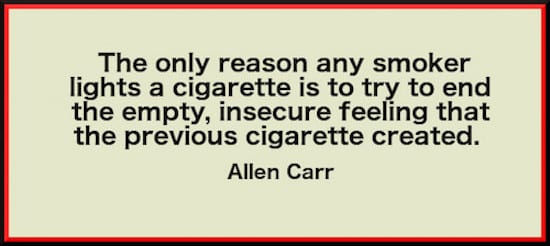
Childhood Obesity News is discussing Allen Carr, who opened a clinic to help people quit smoking, and started his career as an author with The Easy Way to Stop Smoking, now available for free as a PDF file. In the words of writer Michael Day, Carr’s object was to “reverse years of brainwashing that addicts had suffered at the hands of nicotine.” Day also says:
Famously, the book […] dismisses the lies that smokers tell themselves.
This is reminiscent of what people in the obesity-fighting field call Fatlogic. In Chapter 3, Carr unpacks some of the tall tales and rationalizations that smokers concoct in order to perpetuate the habit. He writes:
Many smokers believe they enjoy the taste and smell of the tobacco. It is an illusion. What we are actually doing when we learn to smoke is teaching our bodies to become immune to the bad smell and taste in order to get our fix…
It is a trap, Carr says, and…
The trap is so designed that we try to stop only when we have stress in our lives, whether it be health, shortage of money or just plain being made to feel like a leper.
He emphasizes that willpower is not required. All that a person must do is follow the instructions. And remember — you’re not quitting. You’re escaping. (Self-talk seems to be an important feature of many therapeutic endeavors.)
Touted by many people with boatloads of name recognition, the book scaled the heights of international best-sellerdom and made Carr wealthy. He conducted groups, and saw clients privately if their fame would be distracting to a group. His initial establishment eventually grew into 100 Easyway clinics, situated in many countries, which are staffed by members of ACTI (Allen Carr Therapists International).
To qualify, they need to have personally followed his method to stop smoking. Day wrote:
In his second book, The Only Way To Stop Smoking Permanently, Carr decided — to the horror of family and friends — to take up smoking again for a brief period in the 1990s. He did it to demonstrate, he said, to himself and others, that his approach to quitting still worked. In a matter of weeks he was back up to 60 cigarettes a day.
It was definitely a “Kids, don’t try this at home” situation. It is amazing, what some folks are willing to do just to prove a point, but Carr was able to quit the habit again. He developed lung cancer anyway.
Day wrote: “Carr blamed his illness on the decades spent in smoke-filled rooms helping others quit.” What about his own early history of smoking up to 100 cigarettes per day for 30 years?
Allen Carr died in 2006, but the work continues. Among the success stories are a very impressive number of celebrity endorsements — we’re talking Oprah Winfrey! Also, Anthony Hopkins, Pink, Ashton Kutcher, Bill Wyman, James Spader, Chrissie Hynde, Patricia Arquette, Goldie Hawn, Johnny Cash, Lou Reed, Anjelica Huston, Julie Christie, Paul F. Tompkins… Some, like Ellen DeGeneres, can even be seen on YouTube, telling how Carr helped them.
The satisfied customers are not just entertainers with high Q scores. In the search box, the success stories can be filtered to show testimonials in the categories of Media, Corporate, Medical, and Public.
Your responses and feedback are welcome!
Source: “Easy Way to Stop Smoking,” Ynet.co.il, 1999
Source: “Allen Carr,” NIH.gov, 12/16/06
Source: “Success Stories,” AllenCarr.com, undated
Image by Pat Hartman

 FAQs and Media Requests:
FAQs and Media Requests: 











